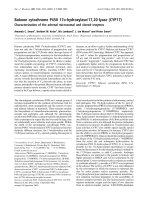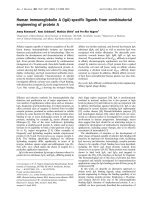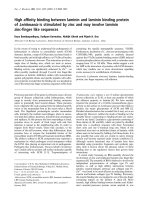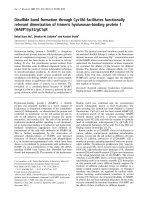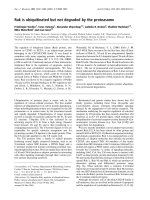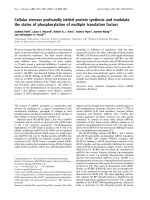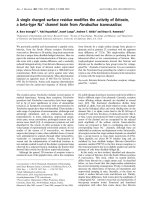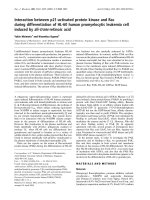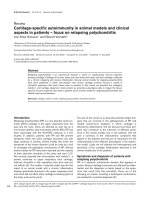Báo cáo y học: "Objective Structured Clinical Examinations (OSCEs), psychiatry and the Clinical assessment of Skills and Competencies (CASC)Same Evidence, Different Judgement" ppsx
Bạn đang xem bản rút gọn của tài liệu. Xem và tải ngay bản đầy đủ của tài liệu tại đây (215.97 KB, 6 trang )
DEBATE Open Access
Objective Structured Clinical Examinations
(OSCEs), psychiatry and the Clinical assessment
of Skills and Competencies (CASC)Same Evidence,
Different Judgement
Steven Marwaha
Abstract
Background: The Objective Structured Clinical Examination (OSCE), originally developed in the 1970’s, has been
hailed as the “gold standard” of clinical assessments for medical students and is used within medical schools
throughout the world. The Clinical assessment of Skills and Competencies (CASC) is an OSCE used as a clinical
examination gateway, granting access to becoming a senior Psychiatrist in the UK.
Discussion: Van der Vleuten’s utility model is used to examine the CASC from the viewpoint of a senior
psychiatrist. Reliability may be equivalent to more traditional examinations. Whilst the CASC is likely to have
content validity, other forms of validity are untested and authenticity is poor. Educational impact has the potential
to change facets of psychiatric professionalism and influence future patient care. There are doubts about
acceptability from candidates and more senior psychiatrists.
Summary: Whilst OSCEs may be the best choice for medical student examinations, their use in post graduate
psychiatric examination in the UK is subject to challenge on the grounds of validity, authenticity and educational
impact.
Background
The Objective Structured Clinical Examination (OSCE),
originally developed in the 1970’s, has been hailed as the
“gold standard” of clinical assessments for medical stu-
dents [1] and is used within medical schools throughout
the world [2]. In terms of Miller’s triangle [3] describing
a framework for clinical assessment, OSCEs aim to
examine skills and ability at the “shows how” level, with
an expectation that this might reflect performance in
day to day real life clinical situations.
OSCEs develop ed in response to the difficulties identi-
fied with traditional long case clinical examinations.
There was very often a lack of transparency about t he
objectives of the assessment and the competencies
required to succeed. Also, n o clear marking system
resulted in variability between assessors and individual
examiners were not always consistent ov er time [4].
This subjectivity, the potential for examiner bias [5], and
the use of small numbers of real cases was also linked to
perceived unfairness.
Thus the charge was that long cases lacked reliability
and validity and were unfair to those assessed. In his
seminal paper on OSCEs, Harden [6] outlined an alter-
native, espousing its objectivity, its reliability and the
controlled standardized testing of multiple competen-
cies, thereby eliminating non-candidate variance in
results.
This debate paper aims to critically appraise the use of
OSCEs as a method of assessment in the membership
examination of the Royal College of Psychiatrists UK
(MRCPsych), although the arguments are likely to apply
to other postgraduate psychiatric examinations. The
OSCE in the MRCPsych is called the Clinical Assess-
ment of Skills and Competencies (CASC) and it seeks to
measure psychiatric competence. The framework of Van
der Vleuten’s utility model [7] is used to examine the
Correspondence:
Rm B149. Medical School Building, Gibbet Hill Campus Warwick Medical
School University of Warwick Coventry CV47AL UK
Marwaha BMC Psychiatry 2011, 11:85
/>© 2011 Marwaha; licensee BioMed Central Ltd. This is an Open Access article distributed under the terms of the Creative Commons
Attribution License ( which permits unrestricted use, distribution, and reproduction in
any medium, provided the original work is properly cited.
CASC’s strengths and weaknesses from the position of a
senior psychiatrist, seeking to promote psychiatric skills
and ultimately to susta in improving patient care. Balan-
cing the different elements of reliability, validity, accept-
ability, educational impact and costs, and the needs of
stakeholders in reaching a compromise is inherent to
the model [8]. I examine evidence pertaining to OSCEs
in general before specifically discussing the CASC.
Discussion
Reliability
Many researchers have studied the reliability of OSCEs
in a wide variety of subjects, most frequently focussing
on their use with medical students. Large and well con-
ducted investigations show that OSCEs tend to be reli-
able [9]. Generalisibility coefficients seem however to
haveafairlywiderangefrom0.4to0.85,withthebulk
of coefficients being between 0.5-0.6 suggesting moder-
ate reliability [10]. This variability is likely to be due to
examinees variable performance on different OSCE sta-
tions (content specificity) but means that many OSCEs,
including high stakes examinations do not reach the
reliability coefficient threshold of 0.8 or over [11] which
is widely regarded as the marker of sufficiency.
Whilst reliability will be improved by increased sam-
pling of content [12], a variety of other factors such as
the number of stations r equired and thus time taken
may have an inf luence also. For example in an OSCE
assessing surgical residents, high reliability (>0.8) was
dependent on using 38 stations and a 3 hour test [13],
raising questions of the assessment depth when each
station lasted for 4.5 minutes. A solution to the poten-
tial superficiality of stations whilst maintaining reliability
is to lower station number to 8 but increasing test
length to 4 hours [14]
OSCEs usually require at least 4 hours of testing for
them to be reliable overall [15]. With such long exami-
nation times, concerns about costs and acceptability to
students are real issues. Also difficulties with organisa-
tion and examinee tiredness begin to ultimately affect
the psychometric properties of the assessment. This may
be particularly difficult to justify in high stakes exams
such as the CASC.
Another issue is that whilst increasing test length may
increase the reliability of assessment, it appears to do so
differentially for the range of competencies under test.
Thus for c ommunicati on skills, test time only needs to
be 2 hours to achieve a coef ficient of 0.7, but 6 hours is
required for reliable assessment of history taking skills
[16]. With the CASC the Royal College of Psychiatrists
seek to assess history taking skills, mental state tests and
more complex process based ability all in one assessment.
It is unclear whether it is feasible to test such variable
content in a through way and with good reliability.
The CASC like many other OSCEs replaced long case
examinations with the express purpose that it would
have better reliability. However it is not at all clear
whether OSCEs are necessarily more reliable than tradi-
tional long cases. Wass et al [17] report a well con-
structed and naturalistic experiment with final year
medical students undergoing OSCEs, with a subsample
sitting observed and unstandardized long cases. With an
assessment of 3.5 hours for history taking, long cases
were equally reliable as OSCEs. A review of the available
evidence suggests that from 1-4 hours of testing time,
an examination based on long cases is at least as reliable
as one based on OSCEs [8].
Assessment objectification or “ asetofstrategies
designed to reduce measurement error” [18] is a major
part of the value placed on OSCEs and on the CASC.
However reliability does not wholly depend on objectifi-
cation and standardizing the testing environment.
Appr aisal of a number of small studies [8] suggests that
it is sampling across a number of clinical domains that
reduces this measurement error as opposed to attempts
at objectivity per se. The CASC in fact implicitly accepts
some degree of subjectivity in assessment by using a
global score to assign pass/fa il decisions, implemented
because global judgments of mast ery appear to b e more
reliable than checklists [19].
There is no published data on the reliability of the
CASC. Given the number of stations and testing time,
the reliability may well be reasonable but this remains
to be seen. The caveats about the reliability of OSCEs
(in general and in comparison to lon g cases), raise the
question of whether the CASC is the ideal response to
the perceived difficulties of using long cases in the pre-
vious MRCPsych system.
Validity
There are numerous studies that have investigated the
validity of the use of OSCEs in clinical examinations of
medical students and a full review of all of these is out-
side the scope of the current discussion. In the main, by
demon strating that the results of OSCEs: relate to other
examin ations; discriminate between candidates of differ-
ent experience; and that on the face of it the exam cov-
ers appropriate areas, thes e studies indicate OSCEs can
have face, content, construct and concurrent validity.
Investigations spannin g the globe and multiple sub-spe-
cialities with undergraduates show similar results,
thereby increasing confidence [7,20].
For example in Jamaica, paediatrics students taking an
OSCE found it to have a high level of fairness, authenti-
city and comprehensiveness suggesting face and content
validity [21]. In a large study of a cohort of medical stu-
dents (N = 435) comparisons were made between
scores on an OSCE and those from work place based
Marwaha BMC Psychiatry 2011, 11:85
/>Page 2 of 6
assessments, multiple choice exams and essays. There
was a high degree of concurrent validity with correlation
coefficients reaching 0.7 in most of the measurements
[22].
Alternative views and contradictory evidence on the
validity of OSCEs is however also available. For example
an investigation in Canada of concurrent validity of
OSCE test scores with other assessment procedures
found correlation coefficients ranging from 0.1 to 1 with
the coefficient rising to above 0.7 only in a minority of
the comparisons [10]. In a selective narrative review of
the OSCE literature, Barman [23] is highly critical of the
validity of OSCEs, suggesting that their predictive and
concurrent validity is, in general, too low to be useful
and that cognitive tests are more “psychomet rically effi-
cient” as measures of performan ce. He concludes that
OSCEs should be one of a number of different examina-
tions to test clinical skills.
Concerns were raised early in the OSCE movement
about whether they could capture and adequat ely reflect
the complexity of psychiatry cases within medical stu-
dent exams. Hodges completed a number of investiga-
tions i n this area. By examining the performance of 33
students and 17 Residents, Hodges et al [24] reported
that the Psychiatry OSCE had construct and concurrent
validity. These results were repeated in a later, methodo-
logically robust and much larger sampled investigation
[25]. Medical students have also found Psychiatry
OSCEs to be acceptable and feasible [26].
Thus it does a ppear that for medical students, a n
OSCE approach to examining Psychiatry cases can be
valid. It is much less clear whether an OSCE such as the
CASC can assess higher order thinking or advanced psy-
chiatric skills that a senior Psychiatrist would need to
have. Hodges investigated the suitability of OSCEs to
exami ne Psychiatry Residents whilst validati ng an OSCE
for medical students. The Residents believed the OSCE
would e nable the identification of inadequate or unsafe
medical students, but were disparaging about whether
they were suitable to assess aspects of Psychiatry such
as “ interpersonal connection”, transference issues or
other complex phenomenon that are clinically important
[27].
Thus a major area of concern of using OSCEs such as
the CASC in postgraduate psychiatric assessment is the
aut henticity of clinical encounters. One aspect of this is
the validity of using actors or standardized patients in
psychiatry examinations, although the available evidence
is fairly reassuring. Studies from general medicine sug-
gest that doctors cannot pick out standa rdized patients
played by actors [28,29].
Whilst nearly all of the literature regarding ps ychiatric
simulated patients is descriptive it does suggest face
validity. The only psychometric assessment to the
author’s knowledge pertains to a simulated depression
patient acted over the course of 1 year and this sug-
gested a high degree of reliability [30]. Despite this it is
clear that actors will not be able to emulate signs such
as thought disorder, blunted affect or disorganization.
Also risks remain that simulated patients will represent
a text book as opposed to a real life case.
Another aspect of authenticity is the extent to which
simulations really do represent r eal psychiatric encoun-
ters. Stations of 10 minutes or less within the CASC
inevitably m ean that small component part s of psychia-
tric skills will be tested and a ho listic assessment of the
whole person is unlikely to be possibl e [31]. Underlying
the OSCE method is a reductionist paradigm suggesting
human behaviour and problem solv ing skills can be split
into component parts and then meaningfully scrutinised.
Hodges [32] eloquently argues that the validity of an
assessment is intricately linked to and a function of con-
text. It is therefore doubtful that a single or a number of
10 minute OSCE stations can represent the depth of a 1
hour clinical assessment with a single patient, something
which is fairly routine in clinical practice.
CASC stations are task driven and difficult to general-
ize. They would seem very distinct from real life clinical
situations which are much more about process and link-
ing several aspect s of the history to produce a formula-
tion. Indeed assessing ability within a CASC, to do a
psychodynamic formulation would seem somewhat
impossible. Even Harden [6] in his original paper on
OSCEs suggested that compartmentalisation of knowl-
edge and discouraging people from looking broadly at
difficulties was a major issue for OSCEs. Interestingly
Harden advocated additional testing using a long case
or by some form of work based assessment when
OSCEs were used.
It has been asserted that OSCEs such as the CASC
risk sacrificing validity for objectivity [33] with the
potential to test complex processing and judgment
skills becoming subservient to the needs of standardi-
zation. The CASC like other OSCE values thorough-
ness, by requiring candidates to complete numerous
component tasks within the competency being tested.
However senior psychiatric c linicians are not necessa-
rily thorough, but are generally accurate at quickly
identifying the salient difficulty and features of a
patient [34].
Testing context can significantly predict performance
in an OSCE [35]. Therefore focussing a candidate on a
particular area at a CASC station may in itself reduce
the validity of the assessment. Such d irection does not
usually happen for senior clinicians who need to work
outwhatinformationissalientfromwhatthepatient
has said thus far. Arguably that is the meta-skill, which
lies in getting order out of chaos.
Marwaha BMC Psychiatry 2011, 11:85
/>Page 3 of 6
The Royal College of Psychiatrists have used a blue-
printing method [36] in order to develop and demon-
strate content validity [37] of the CASC. However there
are no published studi es of the construct and predictive
validity for the CASC. As is the case with reliability, glo-
bal judgements appear to show better concurrent valid-
ity than checklists in surgery [19,38] as well as in
Psychiatry [39]. As a result of this the CASC uses global
judgements in its marking scheme. Whilst this increases
the flexibility given to the examiners, this mirrors the
flexibility in judgements that examiners of long cases
had [26] that were criticized on the basis of fairness.
Underlying these difficulties of validity and the CASC
is a lack of clarity about what would constitute a valid
clinical examination for those seeking to become
Consultant Psychiatrists. In other words, there is no
“gold standard” by which other assessments could be
compared.
Considering alternatives to the CASC, work place
based assessments might offer a partial alternative. How-
ever as they currently stan d, they suffer their own pro-
blems of subjectivity with those assessed always being
known to assessors and assessor bias being highly likely
after a 4-6 months period. Gleeson [40] describes a pro-
cess of making the long case more objective and able to
validly assess ability. Whilst he spells out a compelling
argument for the Objective Structured Long Examina-
tion Record no psychometric data is presented although
it does appear to increase authenticity.
Educational impact
According to Van der Vleuten [7], “ assessment drives
learning though its format”.InthecaseofOSCEsand
more specifically the CASC, this may have a range of
consequences, some desirable and others less clearly
helpful. These impacts can be at the level of learners
and at the level of the profession, with effects at the lat-
ter level potentially affecting patient care.
One example of a positive educational impact of
OSCE use is that medical student performance
improved and teaching methods became more standar-
dized at a US medical school [41]. Using OSCEs can
also result in students spending much more time on
wards [42] than previ ously. There is a risk however, that
medical students will learn checklists used in OSCEs
resulting in a reduction in their skills [43].
Given assessment objectives should reflect educational
objectives the key question of educational impact is
whether the CASC will or can drive learning and skills
that a re needed to be an effective senior Psychiatrist. It
is clear that the content of OSCEs can influence candi-
dates learning before and long after the test [1].
Therefore one effect of the CASC could be that it
drives a diffusion of skills which a re more generalist in
nature than specialist [35]. Students organize their
learning around a test. As such if passing the CASC
means practicing tasks that could be a sked in 10 min-
utes, why bother developing interview, assessment,
formulation and management skills which are more
complex.
The results of this may be far reaching and difficult to
predict. The CASC format may determine what features
in Consultants are most highly valued and thus fashion
facets of medical professionalism. The CASC may also
subtly shift the skill set of senior psychiatric clinicians
towards a compartmentalising approach potentially
reducing the depth of clinical knowledge and its uses.
This is despite the National Health Service, the major
employer in the UK demanding Consultant Psychiatrists
focus on the most complex of patients [44].
Cost
Clinical examinations tend to be costly because of t he
amount of examiner or patient time needed as well as
indirect costs. Experts in the field regard OSCEs to be
expensive [45], possibly because to achieve the claimed
reliabilities many stations are needed and testing times
long.
However direct comparisons of OSCEs with ot her
methods such as long cases are limited and the cost bal-
ance of OSCEs may even be subject specific. In Psychia-
try using an OSCE compared to a long case for medical
students was found to involve less faculty hours and
therefore led to savings [46]. In surgery, in comparison
to a structured oral examination, an OSCE was more
costly [47].
Acceptability
Given that OSCEs seek to deliver objectivity and trans-
parency in the assessment pro cess, this to some extent
explains why they are acceptable to medical students
[21] and to qualified doctors [48].
However two investigatio ns do seem to suggest that
for Psychiatry at least, seniority predicts having doubts
about the value of OSCEs. In the US, Psychiatry Resi-
dents were more cautious about the usefulness of
OSCEs to test higher psychiatric skills than to test the
safety of medical students [27]. Secondly in an intri-
guing, but albeit small (N = 18) study of participants
who attended a CASC revision course in the UK,
approximately 70% of attendees did not agre e that there
was “no longer a need to use real patients in post-g rad-
uate clinical exams” .Incomparisontotheprevious
examination system, whilst half preferred the CASC,
half were undecided or wished to have a return to using
long cases [49].
It is unclear whether the profession itself finds the
CASC or the types of Psychiatrists it produces
Marwaha BMC Psychiatry 2011, 11:85
/>Page 4 of 6
acceptable or not as there is no available literature. Clin-
icians’ views about how they themselves were assessed
are likely to affect how they perceive the utility of the
CASC. Whilst reservations may re present a gener ational
effect, it would seem inappropriate to exclude any dis-
senting voices as “old fashioned” and protagonists of the
CASC as “modern”.
Summary
OSCEs appear to show reasonable psychometric proper-
ties in terms of reliability and validity when tested in
specific situations. The strongest evidence for their use-
fulness appears to be when they are an assessment
method for medical students, where the overriding need
is to prove safety. The case for their use in the
MRCPsych appears to be more questionable given that
they make tasks necessarily simpler than real life and
may not be able to test hig her psyc hiatric clinical skills.
Whilst the CASC may be reliable (although as yet
unproven), there may be significant problems related to
validity, authenticity and acceptability, including in its
costs.
These difficulties are critical given that a lack of scope
to test more complex psychiatric reasoning in a way
that a longer cli nical assessment might, could affect the
standing of the profession and the future care of
patients. Because it is a test, which is the gateway to
becoming a senior Psychiatrist, a different balance
between the elements of the utility model may be neces-
sary than is currently the case. Such a re-appraisal
should give much higher credence to validity, and whilst
respecting the needs to deliver a fair and reliable assess-
ment, reject the absolute primacy of the n eeds of those
being assess ed. Alternatives to the CASC in the context
of the MRCPsych should be investigated further. Despite
the OSCEs ubiquity, one size does not fit all.
Appendix A
The CASC is the only clinical examination in the mem-
bership examinations for the Royal College of Ps ychia-
trists (MRCPsych). There are 16 stations with the pass
mark being 12 out of the 16 stations. Two circuits are
completed on the same day wi th the fi rst circuit invo l-
ving 8 stations lasting 7 minutes with 1 min prep time.
The second circuit has 4 pairs of linked stations with
each station lasting 10 minutes. This summative assess-
ment is criterion referenced and needs to be pa ssed to
enable a candidate to en ter higher specialist training
which usually after 3 years leads to qualification as a
Consultant. The CASC seeks to test compe tency in
Psychiatry.
The CASC has replaced the previous system of part
I and part II examinations which involved 2 long
cases with each long case involving a partly observed
interview of a real patient. Part II also involved an oral
examination involving some standardized patient man-
agement problems.
Authors information
SM is Associate Clinical Professor of Psychiatry and a
Consultant Psychiatrist in the Coventry Early Interven-
tion Team for people with a first episode of psychosis.
He has supervised and aided junior doctors sitting the
CASC examination.
List of abbreviations
OSCE: Objective Structure Clinical Examination; CASC: Clinical Assessment of
Skills and Competencies; MRCPsych: Membership of the Royal College of
Psychiatrists UK
Acknowledgements and Funding
SM would like to acknowledge and thank Dr Matthew Broome (Associate
Clinical Professor of Psychiatry) at Warwick Medical School who kindly
commented on a draft of this manuscript.
Writing of this manuscript was not funded from any grant and does not
related to any active grant held by the author.
Authors’ contributions
SM conceived of, investigated and wrote this article. The views expressed
are the authors.
Competing interests
The author declares that they have no competing interests.
Received: 9 February 2011 Accepted: 16 May 2011
Published: 16 May 2011
References
1. Hodges B: Validity and the OSCE. Medical Teacher 2003, 25:250-254.
2. Rothman AI, Cohen R: Proceedings of the 6th Ottawa Conference on medical
Education Toronto: University of Toronto Bookstore Publishing;292-321.
3. Miller GE: The assessment of clinical skills/competence/performance.
Academic Medicine 1990, 65:63-67.
4. Wilson GM, Lever R, Harden RMcG, Roberston JIL, MacRitchie J:
Examination of Clinical Examiners. The Lancet 1969, 1:37-40.
5. Maxim BR, Dielman TE: Dimensionality, Internal consistency and inter
rater reliability of clinical performance ratings. Medical Education 1987,
21:130-137.
6. Harden RMcG, Stevenson M, Downie WW, Wilson GM: Assessment of
Clinical Competence using Objective Structured Examination. British
Medical Journal 1975, 1:447-451.
7. Van der Vleuten CPM: The assessment of professional competence:
Developments, research and practical implications. Advances in Health
Sciences Education 1996, 1:41-67.
8. Van der Vleuten CPM, Schuwirth LWT: Assessing professional competence:
from methods to programmes. Medical Education 2005, 39:309-317.
9. Vu NV, Barrows HS: Use of standardized Patients in Clinical Assessments:
Recent Developments and Measurements Findings. Educational
Researcher 1994, 23:23-30.
10. Turner JL, Dankoski ME: Objective Structured Clinical exam: A Critical
Review. Family Medicine 2008, 40:574-8.
11. Boulet JR, McKinley DW, Whelan GP, Hambleton RK: Quality assurance
methods for performance-based assessments. Advances Health Science
Education Theory Practice 2003, 8:27-47.
12. Swanson DB, Norman Linn RL: Performance-based assessment: lessons
from health professions. Educational research 1995, 24:5-11.
13. Sloan DA, Donnelly MB, Schwartz Strodel WE: The Objective Structured
Clinical Examination. Annals of Surgery 1995, 222:735-742.
14. Swanson DB: A measurement framework for performance based tests. In
Further developments in assessing clinical competence. Edited by: Hart IR,
Harden RM. Montreal: Can-Heal; 1987:13-45.
Marwaha BMC Psychiatry 2011, 11:85
/>Page 5 of 6
15. Van der Vleuten CPM, Swanson DB: Assessment of clinical skills with
standardized patients: state of the art. Teaching and Learning in Medicine
1990, 2:58-76.
16. Swanson DB, Norcini JJ: Factors influencing reliability of tests using
standardized patients. Teach Learn Med 1989, 1:158-66.
17. Wass V, Jones R, van der Vleuten : Standardised or real patients to test
clinical competence? The long case revisited. Medical Education 2001,
35:321-5.
18. Van der Vleuten CPM, Normal GR, DeGraff E: Pitfalls in the persuit of
objectivity: issues of reliability. Medical Education 1991, 25:110-118.
19. Regehr G, MacRae H, Reznick R, Szalay D: Comparing the psychometric
properties of checklists and global rating scales for assessing
performance on an OSCE-format examination. Academic Medicine 1998,
73:993-7.
20. Carraccio C, Englander R: The objective structured clinical examination: a
step in the direction of competency-based evaluation. Arch Pediatr
Adolesc Med 2000, 154:736-41.
21. Pierre R, Wierenga A, Barton M, Branday JM, Christie CDC: Student
evaluation of an OSCE in Paediatric at the Univsertisty of the West
Indies, Jamaica. BMC Medical Education 2004, 4:22.
22. Auewarakul C, Downing SM, Jaturatamrong U, Praditsuwan R: Sources of
validity evidence for an internal medicine student evaluation system: an
evaluative study of assessment methods. Medical Education 2005,
39:276-83.
23. Barman A: Critiques on the Objective Structured Clinical examination.
Annals of the Academy of Medicine of Singapore; 2005:34:478-82.
24. Hodges B, Regehr G, Hanson M, McNaughton N: Validation of an objective
structured clinical examination in psychiatry. Academic medicine 1998,
73:910-2.
25. Park RS, Chibnall JT, Blaskiewicz , Furman G, Powell J, Mohr CJ: Construct
Validity of an Objective Structured Clinical examination (OSCE) in
Psychiatry: Associations with the Clinical Skillls examination and other
indicators. Academic Psychiatry 2004, 28:122-128.
26. Hodges B, Lofchy J: Evaluating psychiatry clinical clerks with a mini-
objective structured clinical examination. Academic psychiatry 1997,
21:219-225.
27. Hodges B, Hanson M, McNaughton N, Regehr : What do Psychiatry
residents think of an Objective Structured Clinical Examination. Academic
Psychiatry 1999, 23:198-204.
28. Norman GR, Tugwell P, Feighter JW: A comparison of residents
performance on real and simulated patients. Journal of Medical Education
1982, 57:708-715.
29. Rethans JJ, Drop R, Sturmans F, van der Vleuten C:
A method for
introducing standardized patients into general practice consultations.
British Journal of General Practice 1991, 41:94-96.
30. Badger LW, DeGruy F, Hartman J, et al: Stability of standardised patients
performance in a study of clinical decision making. Family Medicine 1995,
27:126-133.
31. Benning T, Broadhurt M: The long case is dead. Long live the long case.
Loss of the MRCPsych long case and holism in Psychiatry. Psychiatric
Bulletin 2007, 31:441-42.
32. Hodges B: Variations on a theme by Harden. Medical Education 2003,
37:1134-1140.
33. Van Thiel J, van der Vleuten CPM, Kraan H: Assessment of medical
interviewing skills: generalisibility of scores using successive MAAS-
versions. In Approaches to assessment of Clinical Competence-Part II. Edited
by: Harden RM, Hart IR, Mulholland H. Norwich: Page Brothers;
1992:536-540.
34. Norman GR, Tugwell P, Feightner W, Muzzin LJ, Jacoby LL: Knowledge and
clinical problem solving. Medical Education 1985, 19:344-56.
35. Blaskiewicz RJ, Park RS, Chibnall JT, Powell JK: The influence of testing
context and clinical rotation order on student OSCE performance.
Academic Medicine 2004, 79:597-601.
36. Cangelosi JS: Designing tests for evaluating student achievement. White
plains New York, Longman; 1990.
37. RoyalCollege of Psychiatrists: 2008 [ />%20CASC%20Blueprint%202.pdf].
38. Cohen R, Rothman AI, Poldre P, Ross J: Validity and generalisibility of
global ratings in an objective structured clinical examination. Academic
Medicine 1991, 66:545-8.
39. Hodges B, Regehr G, McNaughton N, Tiberius R, Hanson M: OSCE
Checklists do not capture increasing levels of expertise. Academic
Medicine 1999, 74:1129-1134.
40. Gleeson F: Assessment of Clinical Competence using the Objective
Structured Long Examination Record (OSLER). Medical Teacher 1997,
19:7-14.
41. Duerson MC, Romrell LJ, Steven CB: Impacting faculty teaching and
student performance: nine years experience with the objective
structured clinical examination. Teaching and Learning in Medicine 2000,
12:176-82.
42. Newble DI, Jaeger K: The effect of assessments and examinations on the
learning of medical students. Medical education 1983, 17:165-171.
43. Van Luijk SJ, Van der Vleuten CPM, Schelven RM: The relation between
content and psychometric characteristics in performance-based testing.
In Teaching and assessing clinical competence. Edited by: bender W,
Hiemstra RJ, Scherpbier AIJA, Zwierstra RP. Groningen: Boekwerk
Publications; 1990:202-7.
44. Departmentof Health: Mental health: New ways of working for everyone.
2007 [ />PublicationsPolicyAndGuidance/DH_074490], accessed 20th January 2011.
45. Epstein RM: Assessment in Medical Education. MThe New England Journal
of Medicine; 2007:356:387-96.
46. Hodges B, Regehr G, Hanson M, McNaughton N: An objective Structured
Clinical examination for Evaluating Psychiatric Clinical Clerks. Academic
Medicine 1997, 72:715-721.
47. Cusimano MD, Cohen R, Tucker W, Murnaghan J, Kodama R, Reznick R: A
comparative analysis of the costs of administration of an OSCE
(objective structured clinical examination). Academic Medicine 1994,
69:571-6.
48. Varkey P, natt N, Lesnick T, Downing S, Yudkowsky : Validity evidence for
an OSCE to assess competency in systems-based practice and practice-
based learning and improvement: a preliminary investigation. Academic
Medicine 2008, 83:775-80.
49. Whelan P, Larence-Smith G, Church L, Woolcock C, Meerten M, Rao R:
Good bye OSCE, Hello CASC: a mock CASC course and examination.
Psychiatric Bulletin 2009, 33:149-153.
Pre-publication history
The pre-publication history for this paper can be accessed here:
/>doi:10.1186/1471-244X-11-85
Cite this article as: Marwaha: Objective Structured Clinical Examinations
(OSCEs), psychiatry and the Clinical assessment of Skills and
Competencies (CASC)Same Evidence, Different Judgement. BMC
Psychiatry 2011 11:85.
Submit your next manuscript to BioMed Central
and take full advantage of:
• Convenient online submission
• Thorough peer review
• No space constraints or color figure charges
• Immediate publication on acceptance
• Inclusion in PubMed, CAS, Scopus and Google Scholar
• Research which is freely available for redistribution
Submit your manuscript at
www.biomedcentral.com/submit
Marwaha BMC Psychiatry 2011, 11:85
/>Page 6 of 6
